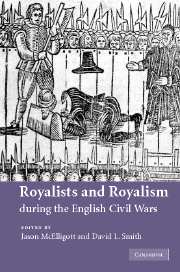Book contents
- Frontmatter
- Contents
- Notes on contributors
- Preface
- Abbreviations
- 1 Introduction: rethinking royalists and royalism
- 2 A lesson in loyalty: Charles I and the Short Parliament
- 3 The Court and the emergence of a royalist party
- 4 Varieties of royalism
- 5 Royalist reputations: the Cavalier ideal and the reality
- 6 Counsel and cabal in the king's party, 1642–1646
- 7 ‘I doe desire to be rightly vnderstood’: rhetorical strategies in the letters of Charles I
- 8 Royalists and the New Model Army in 1647: circumstance, principle and compromise
- 9 The royalist origins of the separation of powers
- 10 ‘A No-King, or a New’. Royalists and the succession, 1648–1649
- 11 The royalism of Andrew Marvell
- Subject Index
- Author Index
1 - Introduction: rethinking royalists and royalism
Published online by Cambridge University Press: 19 July 2009
- Frontmatter
- Contents
- Notes on contributors
- Preface
- Abbreviations
- 1 Introduction: rethinking royalists and royalism
- 2 A lesson in loyalty: Charles I and the Short Parliament
- 3 The Court and the emergence of a royalist party
- 4 Varieties of royalism
- 5 Royalist reputations: the Cavalier ideal and the reality
- 6 Counsel and cabal in the king's party, 1642–1646
- 7 ‘I doe desire to be rightly vnderstood’: rhetorical strategies in the letters of Charles I
- 8 Royalists and the New Model Army in 1647: circumstance, principle and compromise
- 9 The royalist origins of the separation of powers
- 10 ‘A No-King, or a New’. Royalists and the succession, 1648–1649
- 11 The royalism of Andrew Marvell
- Subject Index
- Author Index
Summary
Royalism has never been particularly fashionable among historians of the English Civil Wars. There has long been an unfortunate tendency to dismiss those who were loyal to the Stuarts as, in the immortal words of 1066 and All That, ‘wrong but romantic’, or as the products of unthinking political and religious reaction. We do possess a number of first-class studies of those who were loyal to the monarch, but when one compares this work to the multitude of books and articles on the various parliamentarians and sectaries of the period one is struck by the great imbalance between the two. As long ago as 1981 Ronald Hutton drew our attention to the lack of research on royalism, and a decade later Conrad Russell wrote that
it is the English Royalists, not the English Parliamentarians, who are the real peculiarity we should be attempting to explain … The intellectual and social antecedents of Royalism have not yet been studied with the care which has for many generations been lavished on the Parliamentarians.
Since then, a number of important studies have been produced by historians and literary scholars, including David L. Smith's Constitutional Royalism and the Search for Settlement (1994), Michael Mendle's Dangerous Positions: The Estates of the Realm and the Making of the Answer to the XIX Propositions (1985), James Loxley's Royalism and Poetry in the English Civil Wars: The Drawn Sword (1997), Jerome de Groot's Royalist Identities (2004), and Geoffrey Smith's excellent The Cavaliers in Exile, 1640–1660 (2003).
- Type
- Chapter
- Information
- Royalists and Royalism during the English Civil Wars , pp. 1 - 15Publisher: Cambridge University PressPrint publication year: 2007



